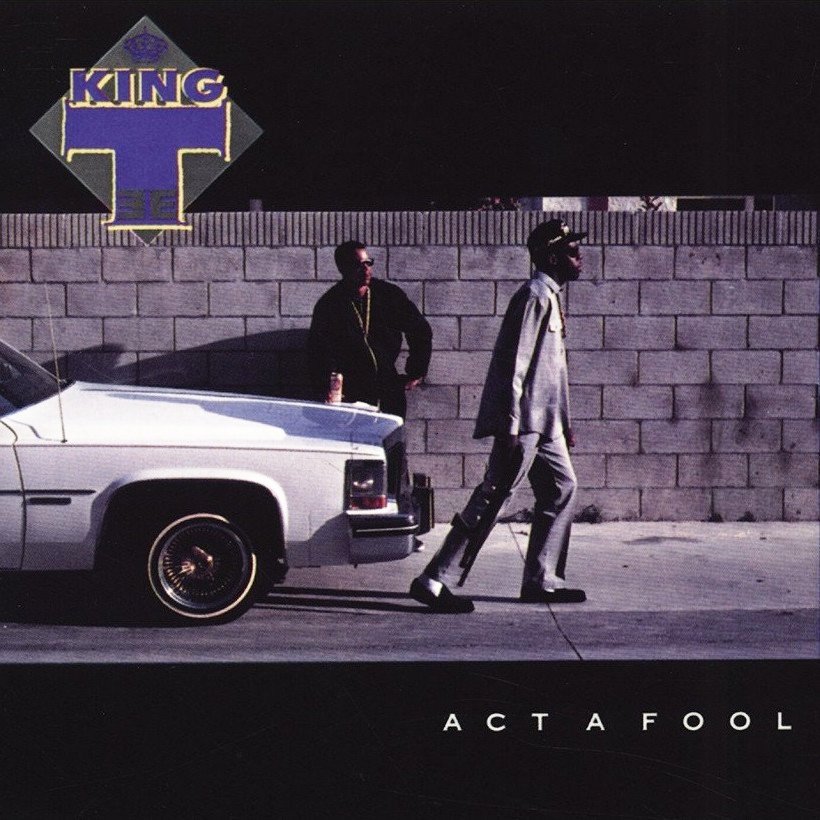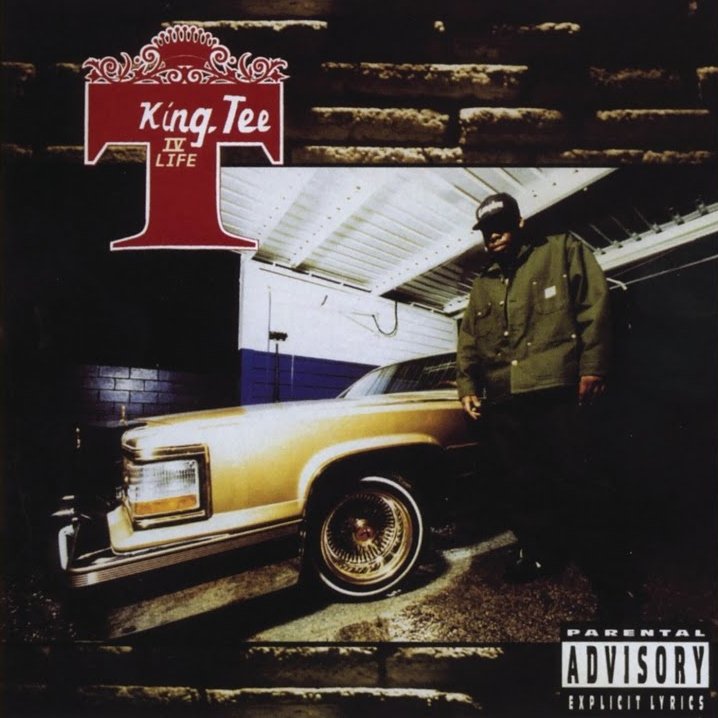Happy 30th Anniversary to King Tee’s third studio LP Tha Triflin’ Album, originally released January 26, 1993.
Roger “King Tee” McBride is Compton, California’s often forgotten hip-hop O.G., who has been one of the finest emcees on the West Coast for decades, earning his reputation for greatness through the memorable music he released during his late ’80s to mid ’90s heyday. A consummate lyricist, King Tee was just as apt to kick a battle rhyme as he was to tell a tale of navigating the streets of his hometown.
King Tee spent the better part of his career working with producer Mark “DJ Pooh” Gordon, an influential beatmaker and future screenwriter. The two began their partnership with Tee’s 1988 debut album Act a Fool and continued to craft sensational music together. They’re also known for collaborating on the infamous TV/radio commercials for St. Ides malt liquor during the late ’80s and early ’90s. The brief spots were better than the material you’d find on some albums of the time.
One of King Tee’s best and most successful albums was Tha Triflin’ Album, his third release, which dropped a quarter of a century ago. It was viewed as a bit of a bounce-back after At Your Own Risk (1990). Not that At Your Own Risk was bad by any stretch of the imagination, but it featured a few unfortunate attempts at pop appeal that marred its overall reception. King Tee went back to make straight-ahead dope music with Tha Triflin’ Album, and it resulted in arguably the best album of his career. Like many a “gangsta” rapper, he maintained a balance between being humorous and reflecting the raw feelings of Los Angeles citizens following the 1992 Riots.
Tha Triflin’ Album is like the drunken cousin of Ice Cube’s Death Certificate, in both sound and feel. Both feature a lot of DJ Pooh production (though Pooh had been working with Tee since the beginning of his career). Although it’s not nearly as political as Cube’s, King Tee’s album also explores similar themes, serious and otherwise. Both King Tee and Ice Cube are gifted storytellers, but King Tee also has a bedrock foundation as a lyricist, and thus spends more time on record establishing his lyrical skills. And he spends more time getting plastered.
King Tipsy has always been upfront about his proclivity to imbibe in mass quantities. This approach doesn’t change on Tha Trifilin’ Album. King Tee dedicates “Drunk Tekneek,” the album’s opening track, to his desire to indulge in liquid refreshment. King Tee is like Jackie Chan in his “Drunken Master” films, as drinking before recording only seems to make him stronger. He flexes a slur-filled cadence over a slinky DJ Pooh-produced beat that douses keyboards and horns from Ohio Players’ “What It Is” in a liter of Everclear. He raps, “So now I take the stage on my, what? Third comeback / Now I know the tricks of the trade, and where the slum’s at / Blows to the chest, buckshots from the gauge / Page after page King Tee takes the rage.”
Obviously hammered or otherwise, King Tee demonstrates his gift for lyricism throughout Tha Trifilin’ Album. “Just Flauntin’” is one of such exhibitions, as he raps over a beat produced by DJ Aladdin and a young Shafiq Husayn (then known as SLG) and anchored by a loop of Ahmad Jamal’s version of “The World is a Ghetto.” The King’s best pure lyrical display is on the all-to-brief “Tha Great,” the album’s closing track. Over slow-rolling guitar licks and hard-hitting drums, King Tee raps, “Please don’t push, or you wish that you didn’t / We’re goin’ toe to toe, and it ain’t no kicking / My moves are kinda slick and my punches be stickin’ / So put up your dukes, you little half-priced chicken / Don’t ‘brother, brother’ me, cause I ain’t your kin / I’m aiming for the end, and I’m off that gin / Tee came to separate boys from the men / If I see another dance step, I’m shooting for the shin.”
Listen to the Album:
Tha Alkaholiks crew made their first appearance on record on Tha Triflin’ Album. E-Swift had already been serving as King Tee’s DJ on At Your Own Risk, but had been down with both J-Ro and Tash at that point. The group features on “Got It Bad Y’all,” the album’s first single. Only two-thirds of the group share the track with King Tee (Tash is absent), but both show they’re ready for primetime.
Over the organ and drums from Lou Donaldson’s “Ode to Billie Joe” and a wailing police siren, J-Ro starts off the song strong, rapping, “On the mic I get wicked, like Wilson Pickett / I get the place jumping like a cricket when I kick shit.” E-Swift was still clearly feeling his way through becoming an emcee, but still drops solid rhymes like “I got more soul than the pick with a fist.” King Tee closes things out, declaring that “I just irritate the wack, leave ’em so confused / When I’m checking on the mic with the 1’s and 2’s.”
Tha Triflin’ Album excels when it maintains this similar care-free, off-the-cuff feeling. “We Got Tha Fat Joint” has the feel of a smoke-filled, in-studio cipher, as King Tee is joined by LA up-and-comers Nefertiti and the crew Mad Kap. Each raps over the drum break from Young Holt Unlimited’s “Wah Wah Man,” along with stabs and scratches provided by producer Broadway. “Bust Dat Ass” is the second cut on the album to feature Tha Alkaholiks, and it’s a much more raucous, late ‘80s-styled hip-hop affair. King Tee, J-Ro, and E-Swift all break fool over the drum track to Sly & The Family Stone’s “Sing A Simple Song” and James Brown vocal drops.
King Tee has always been known to infuse his rhymes with humor, and he continues the practice on Tha Trifilin’ Album. Most of the time it manifests itself when he’s recording songs about his pursuit of the opposite sex. In a nod to the aforementioned Death Certificate, on both “Where’s a Hoe Sat?” interludes, he rhymes from the perspective of a condom, chilling in its owner’s wallet, pining to be used. On the ribald “Blow My Sox Off,” King Tee details his various escapades in pursuit of some loving with an amusing level of raunch.
King Tee teams up with Ice Cube and Deadly Threat to explore the flipside of seeking female attention on “A Hoe B-4 Tha Homie,” a track that forcefully advocates prioritizing long-time friends over “flavor of the month” females. All three emcees contribute banging verses over a slow and funk-drenched DJ Pooh beat that incorporates Funkadelic’s “Nappy Dugout” and The Meters’ “Sissy Strut.” But the song’s prolonged closing interlude injects some extra humor, as Pooh plays up his role as a sucker for love over the strings from The Lost Generation’s “The Sly, the Slick, and the Wicked.” Hearing Pooh, using his best Barry White drawl, beg a woman to allow him to take her shopping and spend all of his money on her never ceases to be funny.
In a change of pace, Tha Triflin’ Album also features King Tee at his most gritty. While T has been considered a “gangsta rapper” throughout his career, very little of what he recorded is traditional gangsta rap. He seems to be considered part of the genre due to his upbringing and his Compton residency.
However, songs like “Triflin’ N***a” are about as grim as gangsta rap got, as King Tee describes the harrowing realities of living in Compton during the ‘80s and ‘90s. He vividly describes feeling trapped within his neighborhood as he grows up, feeling the exorable pull of gang violence grip himself and the generations that follow. As he searches for the means to escape, he raps, “I can’t stands no more so I’mma scram / Sell me a couple of ki’s and buy a crib far away / A place that the map don’t say / ‘Cause I’m getting kinda timid, at first I was with it / Talk about jack moves? I did it.”
Enjoying this article? Click/tap on the album covers to explore more about King Tee:
“Black Togetha Again,” the album’s second single, is another bleak affair, as King Tee describes his mindset after the Rodney King verdict. Over a dark horn and whistle-filled track, he describes the city of Los Angeles descending into chaos. Taking violent action against the LAPD, specifically those officers acquitted of the beating, is the order of the day, as he raps, “It might be at a stop light or maybe at the station / Either way it go, I’m still makin’ bacon.”
King Tee then rails against the economic inequality that permeates areas of Los Angeles where he was raised, and the disparity in wealth that still persists, as he raps, “And I’ll be damned if I get paid at a minimum wage / While they afford to eat like a smorgasbord feast / And leave us here down in the dumps / The place where Donald Trump would get his ass jumped.”
Tha Triflin’ Album is a key component to King Tee’s perennially underrated career. Though this was his last album on Capitol Records, he would go on to release IV Life in 1995, and eventually be one of the first signees to Dr. Dre’s Aftermath label. Though his career stalled for a bit after 1995 (in no small part due to his Aftermath album being shelved), King Tee was as good as anyone during his prime period, and Tha Triflin’ Album is a big reason that he deserves to be remembered and revered as one of the all-time hip-hop greats.
LISTEN:
Editor's note: this anniversary tribute was originally published in 2018 and has since been edited for accuracy and timeliness.



